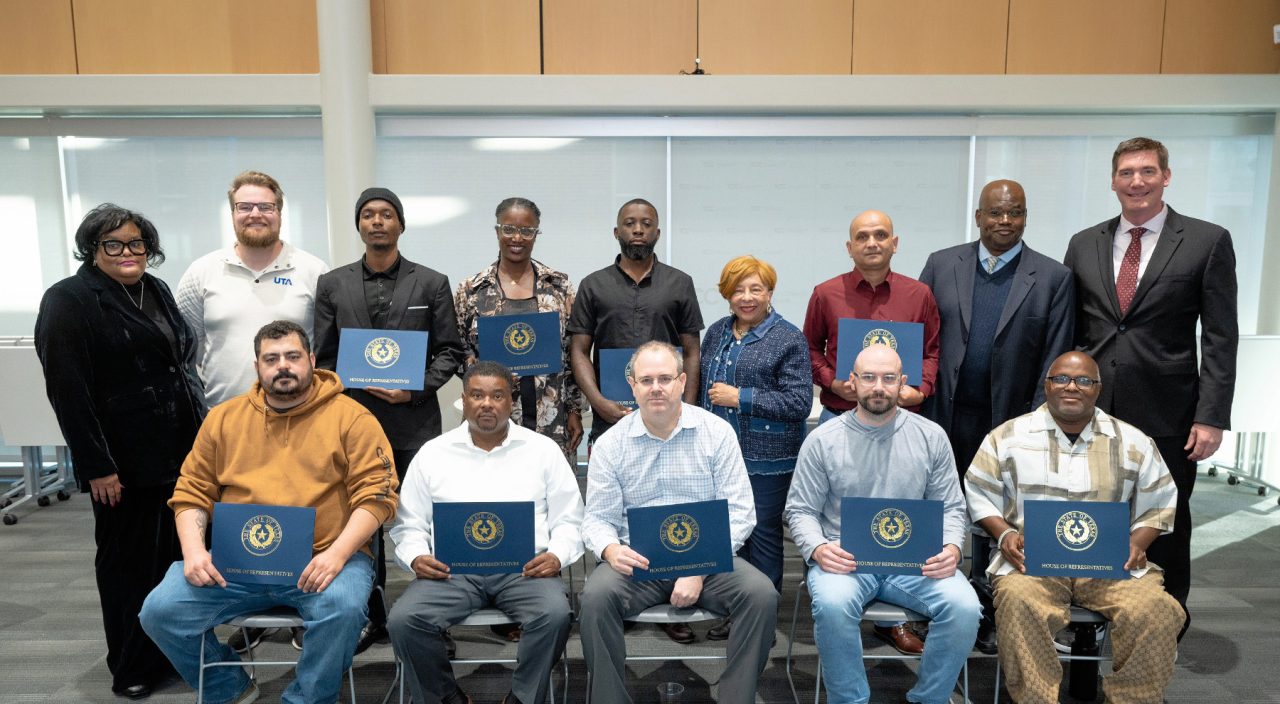FORT WORTH, Texas — Semiconductors are everywhere around us, powering cellphones, computers, televisions, even our cars. They are essential to medical devices people count on every day, from pacemakers and insulin pumps to blood pressure monitors and ventilators.
Although Asian countries dominate global chip manufacturing, the U.S. is in the spotlight with growth fueled by a skilled workforce, strategic geographic advantage and increased government spending. The National Science Foundation, for example, is supporting Tarrant County College, Penn State University and UT Arlington in training future generations of skilled workers for the semiconductor industry.
In early December 10 military veterans completed the collaborating institutions’ new 12-week Microelectronics and Nanomanufacturing Certificate Program (taught at TCC) and received a certificate from Penn State’s Center for Nanotechnology Education and Utilization.
One of the graduates, 41-year-old Derrick Santiago, considers the program a great fit for veterans seeking a rewarding career.
“Veterans can transition into a high-tech field by following this program’s curriculum,” he said. “It utilizes the discipline, flexibility and technical aptitude that many veterans bring to the table. Classroom instruction, practical experience and networking with business executives can lead to fascinating positions in the semiconductor industry.”
Texas is a U.S. chip manufacturing hub, thanks to Samsung and Texas Instruments investing heavily in the state.
“Texas is well-positioned to be the epicenter of America’s semiconductor industry, and TCC’s dynamic faculty are one reason why,” said TCC Chancellor Elva LeBlanc. “Their knowledge and teaching skills make us a perfect partner with Penn State and UTA to prepare area veterans for lucrative semiconductor careers.”
TCC South mathematics Professor Natalie Johnson, one of the people Dr. LeBlanc credits with authoring the NSF grant, sees expanding job opportunities with regional companies.
“The high level of interest from semiconductor companies in hiring veterans highlights the valuable skills they bring to the workforce,” she said. “This connection between the program and potential job opportunities serves as a strong incentive for participants.”
Texas Instruments already has interviewed students to discuss multiple job opportunities. Average starting salaries are $60,000-70,000.
Milton Isaac, 59, served in the U.S. Army until retirement. While he’s not sure where his next job will be, he likes working on the back end, or in quality and testing. “My favorite classes were Safety and Environmental as well as Basic Characterization of Tools.” Isaac calls himself a hands-on person who’s familiar with safety topics, which aligned perfectly with those two classes.
Students in the program covered the basic skills needed to make devices, including laboratory safety, vacuum technology, patterning, microscopy, characterization, thin-film deposition and etching. Lab work took place in a clean room at UT Arlington. Inside the clean room, students wore special suits to protect the tiny microchips from skin particles and dust.
Santiago, who served in the U.S. Navy, said UTA’s clean lab enabled students to apply their academic understanding to practical procedures. “The experience was priceless, from using cutting-edge machinery to creating semiconductor devices in a regulated setting. It taught us the value of cleanliness and accuracy in nanomanufacturing.”
Professor Johnson said she enjoyed teaching the first cohort of veterans, a group that will set the standard for future cohorts.
“Veterans bring strong teamwork skills honed through their military experience,” she explained. “It’s inspiring to see how they support each other in lab work, collaborating to solve problems and refine their clean room techniques.”
The next cohort is expected to launch in January.
For more information or to enroll visit https://www.cneu.psu.edu/military-ed/.
Tarrant County College is one of the nation’s largest higher education institutions and boasts the second lowest tuition of Texas’ Top 10 community colleges. A comprehensive two-year college with six campuses in Tarrant County and online classes, TCC offers a range of opportunities for learners of all ages and backgrounds, including Associate of Arts and Associate of Applied Science degrees; workforce and economic development programs; technical and skilled trades programs; and customized training for area businesses and corporations.

